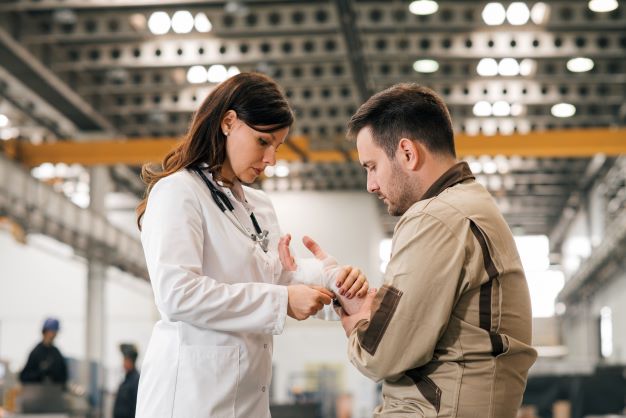While most businesses will be quite dedicated to enforcing well-thought-out health and safety procedures in the workplace, it's still possible for err
While most businesses will be quite dedicated to enforcing well-thought-out health and safety procedures in the workplace, it’s still possible for errors to be made, either on the part of the employee or the employer. If you have sustained an injury in the workplace, you probably shouldn’t be reading this and should instead be seeking medical assistance as soon as possible. However, this article should be useful for those looking for advice on how to deal with potential future accidents so that they can be well-prepared for what steps to take. Here’s everything you’ll need to consider should you or someone you know sustain an injury in the workplace.
Get Immediate Medical Help
Understandably, your first port of call after sustaining an injury is to seek immediate medical assistance. The type of assistance you seek will depend on the severity of the injury, of course. If you suffer a minor wound like a scratch, scrape, or a minor burn, you will want to visit your company’s first aider. If the injury is more severe than this, you may require treatment from a medical professional. Having someone drive you to the emergency department or call for an ambulance may be in order if you’re unable to move. Either way, this medical assistance should be your first step, no matter what.
Make An In-Depth Record
Once you are safe and have been checked by a medical professional, you’ll want to move on to the next important step. This is where you’ll want to create an in-depth report of the events as they happened. This is important so that you can provide an accurate account from your own perspective, which no one can easily dispute due to your memory being vague. This record should include a full recollection of the incident, including times and dates, who else was in the area, and what exactly happened that caused you to become injured. This record will help you if you intend to make a compensation claim, which is why accuracy and truthfulness are very important when creating your record of the events that took place. You’ll also want to record things like who drove you to A&E, which doctors you saw, and anything else you remember to help paint as in-depth a picture as possible.
Gather Evidence
As well as creating a written or verbal record of the events that took place around the time you were injured, you’ll also want to spend some time gathering as much evidence as possible to accompany that record. You’ll have to remember that anyone reading or listening to your record will struggle to visualise the events as they happened. This is why actual visual evidence and other forms of evidence are important. CCTV footage is obviously one of the best examples of this, as are photos of the area where the accident occurred. Suppose you fell from a faulty ladder. In that case, you’ll want to take photos of where you were using the ladder, the surface you had rested the ladder on, and photos of the ladder itself, especially where the fault or break is, such as a broken step or a faulty latch on an extendable ladder.

Create A Report If Required
In certain scenarios, an official report may be required under RIDDOR or the Reporting of Injuries, Diseases, and Dangerous Occurrences Regulations of 2013. This tends to only be required after something very serious, such as a death caused by accident, serious injuries like dismemberment, and industrial-related diseases. If you lose a finger, for example, a report will have to be created for which you may be asked questions. These reports won’t be directly written or submitted by you, however. This will be done only by responsible persons in the company, such as a manager or your employer themselves.
Discuss The Issue With Your Solicitor
If you weren’t responsible for your injury, you might want to consider making a compensation claim. This will require you to contact a solicitor that is experienced in workplace injury claims. Whether you need to make a claim for an arm injury, head injury, or burn, your solicitor will be able to help guide you through this process. They will then decide whether or not you have a case to go ahead with, claiming compensation that can help cover medical treatment, any loss of income, and even money to help you cope with the trauma of suffering a severe injury. You could be in line for a massive payout, for example, if you suffer a life-changing injury that impacts your mobility or ability to work. This is why it’s very important to record the events accurately to increase your chances of a successful claim or legal battle.
Make A Note Of Financial Losses
Certain injuries may not be life-altering, but they could significantly impair your ability to work and prevent you from returning for a significant amount of time. Unfortunately, there is no obligation for your employer to pay you your full salary if you’re off work for a significant amount of time, even if you were injured in the workplace. Because of this, for your compensation claim, you’ll want to make a complete list of financial losses that you’ll experience due to missing work so that you can claim that money back.
Speak To Witnesses
When making a compensation claim, while your own account will be important and generally considered a fair and legitimate account, especially if you have sufficient evidence, you may also want to consider speaking to witnesses. This will allow you to compile reports from others that would have been around at the time of the accident and can verify your story. You could also speak to others who might not have been there, but that can attest to your claims of improper safety procedures in place at your job or faulty equipment. Perhaps someone else has sustained a similar injury in the past or has been hurt by faulty equipment.
Seek Continued Medical Treatment If Necessary
If your injury was severe, you might want to consider further medical treatment. There are many different types of injuries you could sustain in the workplace and many types of treatments you can have depending on your type of injury. Suppose that the injury has damaged muscles and tissue. In that case, you may require physiotherapy to get back to normal movement levels, or you might require counselling or psychotherapy due to the mental trauma of the accident. Your compensation claim can help to facilitate these types of treatment, allowing you to pay for more expensive yet more effective treatments to get you back to work and feeling better as quickly as possible.
Do Not Accept Responsibility
When you sustain an injury at work, one of the most important things to remember is to not claim responsibility for the injury, whether you think it might be your fault or not. If you discover that it wasn’t your fault, but you’ve already stated that it was, it may become very difficult to claim compensation. Discuss the issue with your solicitor before deciding whether to press forward with a claim. This decision will be based on whether you believe you were responsible for the accident or whether or not the company had instructed you how to safely do your job.



















































































































COMMENTS